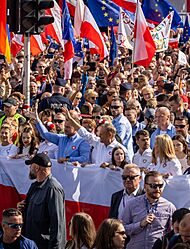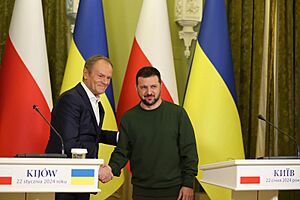Donald Tusk facts for kids
Quick facts for kids
Donald Tusk
|
|||||||||||||||||||||||||||
|---|---|---|---|---|---|---|---|---|---|---|---|---|---|---|---|---|---|---|---|---|---|---|---|---|---|---|---|
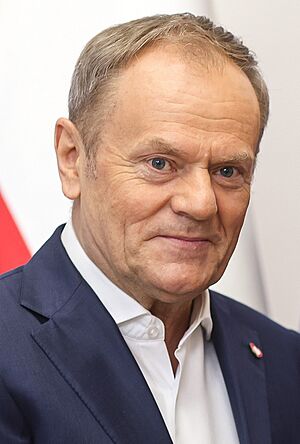
Tusk in 2025
|
|||||||||||||||||||||||||||
| Prime Minister of Poland | |||||||||||||||||||||||||||
| Assumed office 13 December 2023 |
|||||||||||||||||||||||||||
| President | Andrzej Duda Karol Nawrocki (Elect) |
||||||||||||||||||||||||||
| Deputy |
|
||||||||||||||||||||||||||
| Preceded by | Mateusz Morawiecki | ||||||||||||||||||||||||||
| In office 16 November 2007 – 22 September 2014 |
|||||||||||||||||||||||||||
| President |
|
||||||||||||||||||||||||||
| Deputy |
|
||||||||||||||||||||||||||
| Preceded by | Jarosław Kaczyński | ||||||||||||||||||||||||||
| Succeeded by | Ewa Kopacz | ||||||||||||||||||||||||||
| President of the European Council | |||||||||||||||||||||||||||
| In office 1 December 2014 – 30 November 2019 |
|||||||||||||||||||||||||||
| Preceded by | Herman Van Rompuy | ||||||||||||||||||||||||||
| Succeeded by | Charles Michel | ||||||||||||||||||||||||||
| Leader of the Civic Platform | |||||||||||||||||||||||||||
| Assumed office 3 July 2021 |
|||||||||||||||||||||||||||
| Preceded by | Borys Budka | ||||||||||||||||||||||||||
| In office 1 June 2003 – 8 November 2014 |
|||||||||||||||||||||||||||
| Preceded by | Maciej Płażyński | ||||||||||||||||||||||||||
| Succeeded by | Ewa Kopacz | ||||||||||||||||||||||||||
| President of the European People's Party | |||||||||||||||||||||||||||
| In office 1 December 2019 – 1 June 2022 |
|||||||||||||||||||||||||||
| Preceded by | Joseph Daul | ||||||||||||||||||||||||||
| Succeeded by | Manfred Weber | ||||||||||||||||||||||||||
| Deputy Marshal of the Sejm | |||||||||||||||||||||||||||
| In office 18 October 2001 – 18 October 2005 Serving with others
|
|||||||||||||||||||||||||||
| Marshal |
|
||||||||||||||||||||||||||
| Preceded by | Jan Król | ||||||||||||||||||||||||||
| Succeeded by | Bronisław Komorowski | ||||||||||||||||||||||||||
| Deputy Marshal of the Senate | |||||||||||||||||||||||||||
| In office 20 October 1997 – 18 October 2001 Serving with others
|
|||||||||||||||||||||||||||
| Marshal | Alicja Grześkowiak | ||||||||||||||||||||||||||
| Preceded by | Zofia Kuratowska | ||||||||||||||||||||||||||
| Succeeded by | Kazimierz Kutz | ||||||||||||||||||||||||||
|
|||||||||||||||||||||||||||
| Personal details | |||||||||||||||||||||||||||
| Born |
Donald Franciszek Tusk
22 April 1957 Gdańsk, Poland |
||||||||||||||||||||||||||
| Political party |
|
||||||||||||||||||||||||||
| Other political affiliations |
Poland: Civic Coalition (since 2018) European Union: European People's Party (2014–2022) |
||||||||||||||||||||||||||
| Spouse |
Małgorzata Sochacka
(m. 1978) |
||||||||||||||||||||||||||
| Children | 2 | ||||||||||||||||||||||||||
| Education | University of Gdańsk | ||||||||||||||||||||||||||
| Awards |
See list
|
||||||||||||||||||||||||||
| Signature | |||||||||||||||||||||||||||
Donald Franciszek Tusk (born 22 April 1957) is a Polish politician and historian. He has been the Prime Minister of Poland since December 2023. He also held this important role from 2007 to 2014.
From 2014 to 2019, Tusk was the President of the European Council. This is a top job in the European Union. He also led the European People's Party, a big group of political parties in Europe. Donald Tusk helped start Civic Platform (PO), which is one of Poland's main political parties. He has been its leader for a long time. He is the longest-serving prime minister in Poland since 1989.
Contents
Early Life and Political Beginnings
Donald Tusk grew up in Gdańsk, a city in Northern Poland. His family has Polish, German, and Kashubian roots. He sees himself as Polish, Kashubian, and European. His father was a carpenter, and his mother was a nurse.
His grandfather, Józef Tusk, was held in a concentration camp during World War II. Later, he was forced to join the German army. He then joined the Polish forces fighting with the Allies. Tusk says his family's history taught him that "nothing is simple in life or in history." This helped him avoid extreme political ideas.
He studied history at the University of Gdańsk and finished in 1980. During his university years, he was part of the Student Committee of Solidarity. This group worked against Poland's communist government.
Starting a Political Career
Tusk helped create the Liberal Democratic Congress (KLD) party. In 1991, this party won seats in the Polish parliament. Later, the KLD joined with another party to form the Freedom Union. Tusk became a deputy leader of this new party.
In 1997, he was elected to the Senate of Poland, which is like an upper house of parliament. He became its deputy speaker. In 2001, he co-founded Civic Platform (PO). This party is a center-right group. He was elected to the Sejm (the lower house of parliament) again and became its deputy speaker.
Presidential Election in 2005
In 2005, Donald Tusk ran for President of Poland. He was one of the main candidates. Tusk wanted to keep the church and state separate. He also supported Poland joining more closely with Europe and having a free-market economy.
He won the first round of voting. However, he lost in the second round to Lech Kaczyński.
First Time as Prime Minister (2007–2014)
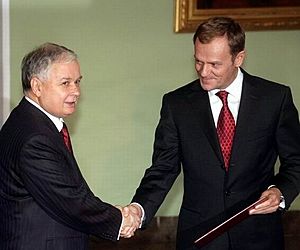
In the 2007 Polish parliamentary election, Donald Tusk and his Civic Platform party won. They defeated the party of the current Prime Minister, Jarosław Kaczyński. Tusk became the Prime Minister of Poland on 16 November 2007.
In the 2011 Polish parliamentary election, Civic Platform won again. This made Tusk the first Polish Prime Minister to be re-elected since 1989. In September 2014, leaders of the European Union chose Tusk to be the next President of the European Council. This was a big step for Poland. Tusk then resigned as Prime Minister, and Ewa Kopacz took over.
Policies as Prime Minister
When he first became Prime Minister, Tusk promised to support free markets. He also wanted to make government simpler and lower taxes. His government focused on building better roads for the UEFA Euro 2012 football championships, which Poland co-hosted.
Tusk also worked to improve Poland's relationships with other countries. He wanted better ties with Germany and Russia. He also decided to bring Polish soldiers home from Iraq.
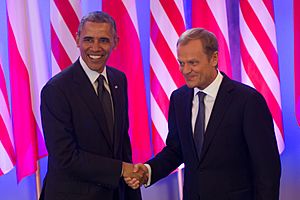
Tusk supported Poland joining the Eurozone, which uses the euro currency. However, during a financial crisis in Europe, this plan was put on hold. From July to December 2011, Poland led the Presidency of the Council of the European Union. During this time, Poland supported Croatia joining the EU.
Leading the European Council (2014–2019)
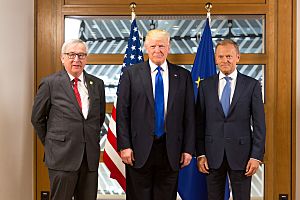
Donald Tusk became the President of the European Council on 1 December 2014. In this role, he worked to unite Europe against Russia's actions in Ukraine. He also tried to manage the large number of migrants coming to Europe.
Before the UK's vote to leave the EU (called Brexit), Tusk warned about the serious problems that could happen. After the UK voted to leave, he took a firm stance on their departure. He said there would be no winners from Brexit.
In March 2017, Tusk was re-elected for a second term as President of the European Council. He received almost all the votes from EU leaders. He continued to work on important European issues.
Return to Polish Politics (2023–Present)
In July 2021, Donald Tusk returned to Polish politics. He became the leader of Civic Platform again. In 2023, Tusk led large protests in Warsaw against the government. These protests aimed to support democracy in Poland. One protest, called the "March of a Million Hearts," brought hundreds of thousands of people together.
2023 Parliamentary Election
In the 2023 Polish parliamentary election, Tusk's Civic Coalition became the second-largest group in parliament. Together with two other opposition parties, they won enough seats to form a new government. On 10 November, these parties officially agreed to support Tusk as their candidate for Prime Minister.
The previous Prime Minister, Mateusz Morawiecki, could not get enough support to stay in power. On 11 December, the parliament voted for Donald Tusk to become Prime Minister for the third time. His new government officially started on 13 December 2023. This ended eight years of rule by the previous party.
Domestic Policies
Since becoming Prime Minister again, Tusk has focused on improving the rule of law in Poland. He also wants to strengthen Poland's relationship with the EU. His government has continued to provide aid to Ukraine after the Russian invasion.
In 2024, Tusk surprised many by taking a strong stance on border security. He supported measures against illegal migration at the border with Belarus. In October 2024, he announced plans to temporarily stop migrants from seeking asylum in Poland. This was due to concerns about border security.
In February 2025, Tusk announced plans to make economic rules simpler to help Poland's economy grow.
Foreign Policies
In January 2024, Tusk visited Ukraine and met with President Volodymyr Zelenskyy. He called for strong support for Ukraine from Western countries. Tusk believes Europe needs to be strong against Russia.
In August 2024, Tusk said that Ukraine could not join the EU without solving issues related to Polish victims of the Volhynian Genocide. This issue is about remembering historical events.
In February 2025, Poland became Europe's top defense spender. Tusk stressed the need for strong ties with the U.S. and for Europe to build its own defense. He also said Polish troops would not go to Ukraine for peacekeeping.
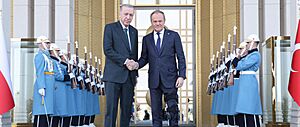
In March 2025, Tusk suggested creating a European "Defense Bank." This bank would help pay for military investments across Europe. He highlighted the need for Europe to defend itself.
Personal Life
Donald Tusk married Małgorzata Sochacka in 1978. They have two children, a son named Michał and a daughter named Katarzyna. They also have five grandchildren.
Tusk is part of the Kashubian minority in Poland. He speaks Polish, Kashubian, German, and English. When he became President of the European Council, he worked hard to improve his English. In 2019, he gave a speech in Romanian, which was well-received.
In 2019, Tusk published his memoir called Szczerze (Honestly). It shares his experiences as President of the European Council.
Awards and Recognition
Donald Tusk has received many awards for his work.
- In 2010, he received the Charlemagne Prize. This award is given for helping to unite Europe. He dedicated it to those who died in a plane crash in Poland in 2010.
- In 2012, he received the Walther-Rathenau-Preis for his work on European integration.
- He has also received honorary doctorates from several universities.
Some of his other awards include:
 Grand Cross Order of the Sun (2008, Peru)
Grand Cross Order of the Sun (2008, Peru) Grand Cross of the Royal Norwegian Order of Merit (2012, Norway)
Grand Cross of the Royal Norwegian Order of Merit (2012, Norway)- Presidential Order of Excellence (Georgia, 2013)
 Order of the Cross of Terra Mariana (2014, Estonia)
Order of the Cross of Terra Mariana (2014, Estonia) The First Class of the Order of Prince Yaroslav the Wise (2019, Ukraine)
The First Class of the Order of Prince Yaroslav the Wise (2019, Ukraine) Grand Cordon of the Order of the Rising Sun (2021, Japan)
Grand Cordon of the Order of the Rising Sun (2021, Japan)
Images for kids
-
Prime Minister Tusk with Russian President Vladimir Putin, February 2008
-
Tusk at the European People's Party Congress in Helsinki, Finland, on 8 November 2018
-
Tusk and Indian Prime Minister Narendra Modi during an official meeting in Warsaw on 22 August 2024
-
German Chancellor Friedrich Merz, French President Emmanuel Macron, British Prime Minister Keir Starmer and Poland Prime Minister Donald Tusk with Ukrainian President Volodymyr Zelenskyy in Ukraine in May 2025
See also
 In Spanish: Donald Tusk para niños
In Spanish: Donald Tusk para niños
- First Cabinet of Donald Tusk
- Second Cabinet of Donald Tusk
- Third Cabinet of Donald Tusk
- History of Poland (1989–present)
- List of political parties in Poland
- List of politicians in Poland
- Politics of Poland
- List of Poles
- 2005 Polish presidential election
- 2005 Polish parliamentary election
- 2007 Polish parliamentary election
- 2011 Polish parliamentary election
- 2023 Polish parliamentary election
 | James B. Knighten |
 | Azellia White |
 | Willa Brown |


